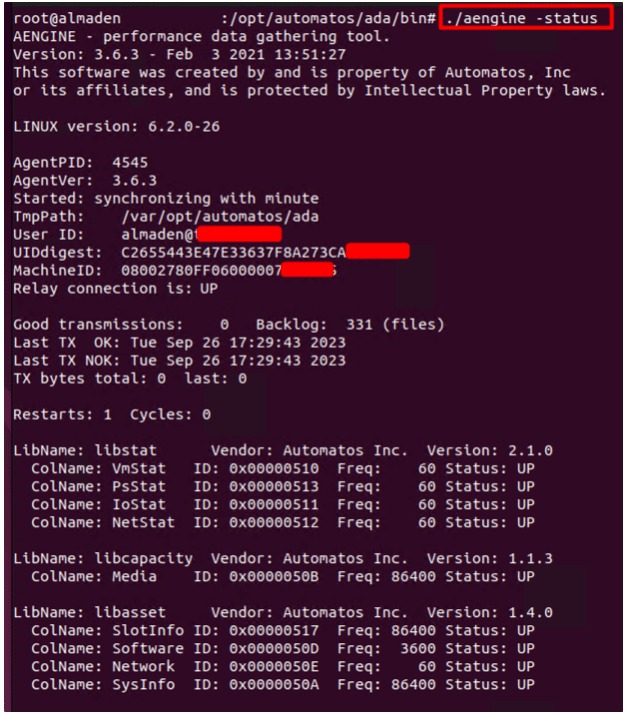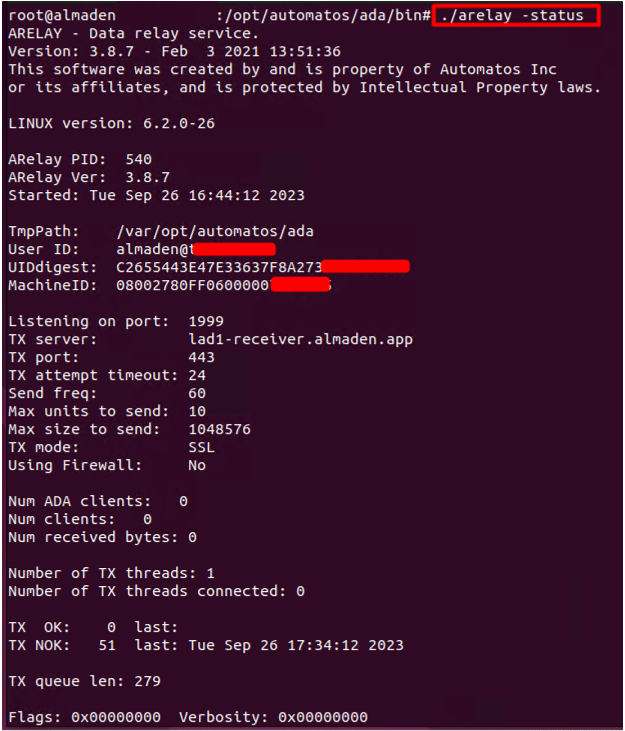Log files – Linux
Introduction
The Desktop Agent and Server Agent have two log modes: the normal mode and the “Verbosity” mode, which provides more detailed information about each data collection point, data processing, and transmission. In some cases, the “Verbosity” mode may be requested, for all other cases, keep only the default mode.
The log files will support our support team in identifying issues or tracking specific information. Below are the directories and files we may request:
Log file – File Path and extension
Desktop Agent (ADA) Log files path
cd /var/opt/automatos/adaServer Agent (ASA) Log files path
cd /var/opt/automatos/asa
Log file extensions: “.elog” and “.rlog”
Note: Please compress this directory as a “.zip” file and send it to us when requested.
Note: If the agents were installed with communication via Relay Central, the file extension “.rlog” will not exist.
Logs – Detailed logs (Verbosity)
Enabling verbose logging causes the Desktop Agent and Server Agent to generate more detailed logs for us to analyze potential communication issues that may arise.
Step 1 – Stop Services
systemctl stop aengine
systemctl stop arelayNote: If the agents were installed with communication via Relay Central, the service “arelay” will not exist.
Step 2 – Open the configuration file
AGENT
#Desktop Agent
vim /opt/automatos/ada/etc/aengine.cfg
#Server Agent
vim /opt/automatos/asa/etc/aengine.cfg
Edit the line and change the last digit to “7” “$VERBOSITY = 0x00000007” and save the file.”
RELAY
#Desktop Agent
vim /opt/automatos/ada/etc/arelay.cfg
#Server Agent
vim /opt/automatos/asa/etc/arelay.cfg
Edit the line and change the last digit to “7” “$VERBOSITY = 0x00000007” and save the file.”
Note: If the agents were installed with communication via Relay Central, the file “arelay.cfg” will not exist.
Step 3 – Compress log files
Required: Please wait at least 30 minutes with verbosity enabled before compressing the directory to send it to us.
# Desktop Agent
cd /var/opt/automatos/ada
# Server Agent
cd /var/opt/automatos/asa
# Log file extensions: “.elog” and “.rlog”Note: Please compress this directory as a “.zip” file and send it to us.
Step 4 – Disable Verbosity
After sending us the log directories, we recommend disabling verbosity to prevent the log file from becoming too large. Set the value of “Verbosity” to 0:
AGENT
#Desktop Agent
vim /opt/automatos/ada/etc/aengine.cfg
#Server Agent
vim /opt/automatos/asa/etc/aengine.cfgEdit the line and change the last digit to “0” “$VERBOSITY = 0x00000000” and save the file.”
RELAY
#Desktop Agent
vim /opt/automatos/ada/etc/arelay.cfg
#Server Agent
vim /opt/automatos/asa/etc/arelay.cfgEdit the line and change the last digit to “0” “$VERBOSITY = 0x00000000” and save the file.”
Note: If the agents were installed with communication via Relay Central, the file “arelay.cfg” will not exist.
Status of agents
The following commands are used to check the configurations applied to the Desktop Agent and Server Agent.
Status – Desktop Agent
Desktop Agent “aengine” and “arelay” status
/opt/automatos/ada/bin/aengine -status
/opt/automatos/ada/bin/arelay -statusStatus – Server Agent
Server Agent “aengine” and “arelay” status
/opt/automatos/asa/bin/aengine -status
/opt/automatos/asa/bin/relay -statusCheck “aengine” and “arelay” status

Note: If the agents were installed with communication via Relay Central, the command “/arelay – status” will not exist.

